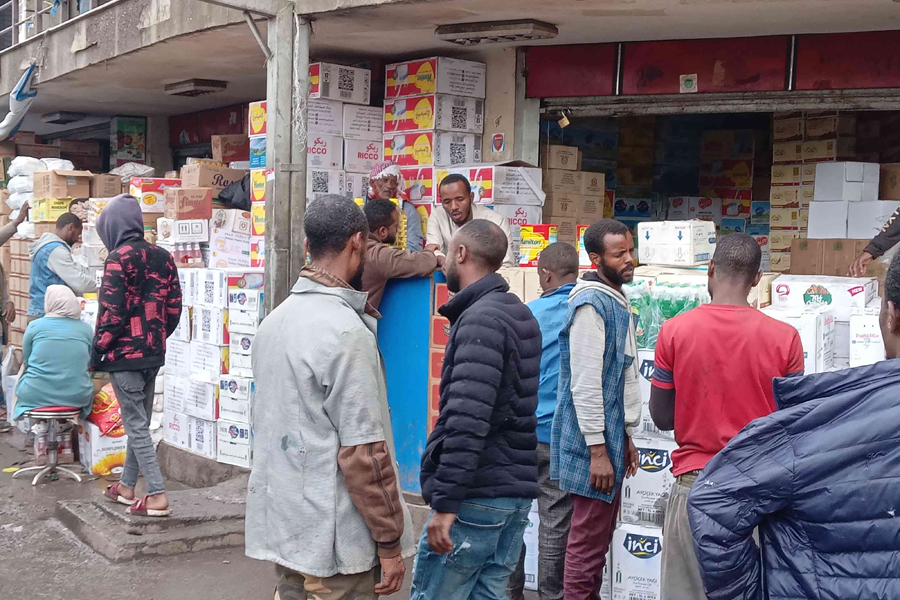
Radar | Jun 25,2022
Dec 25 , 2018
Various regulatory measures have been taken by the National Bank of Ethiopia (NBE) to curb foreign currency from flowing into the parallel market. It is about time that the central bank begins to consider beating the parallel market at its own game, Million Kibret (million.kibret@bdo-ea.com), managing partner at BDO Consulting Plc.
It is an open secret that Ethiopians coming home from abroad with stacks of cash in foreign currencies end up searching for parallel markets to catch market premiums. The proceeds collected at the parallel markets are usually transferred out of the county through various illicit ways.
There is both good and bad news here. The good news is that most people would prefer for their badly needed foreign currencies to be utilised in their home country. The bad news is that there are no formal markets to facilitate this good intention.
Our formal forex markets offer artificially depressed prices despite the unmet demand for foreign currencies by individuals and organisations. These users of forex are desperately looking to meet their needs and relieve themselves from their international exposures, resulting in parallel markets.
It is difficult to eliminate informal markets using formal directives from regulatory organs. Instead, as the prevailing market forces are attracting such moves, the same market attractions can be used to formalise and legalise these transactions.
Taking a lesson from Nigeria, the financial regulatory organ may open a door for the use of special forex windows, which can attract a significant portion of foreign currency we are currently losing to illicit transactions. The regulator thus can carefully select sources of foreign currencies, which have become difficult to be directed to the formal channels using prevailing control mechanisms and directives.
Currently, government organs are doing their level best to ensure that proceeds from goods exports are received at home with reasonably expected values for the prices applicable at the respective international markets. However, it is difficult to use similar ways to control other sources such as remittances and the export of services.
The significance of these sources is expected to increase due to an increasing trend of citizens traveling abroad, given that disposable incomes have grown and as a result of an increase in the value of technical and professional services, which can be provided by individuals and organisations with no letter of credit requirements for delivery of the transactions.
With the increase in value and intensity of technological innovations during our era, the value of intangibles is overtaking the price of tangible products. Trying to control export proceeds by controlling the value and volume of tangible items would be like giving up the ox and fighting for its tail.
Understanding these trends, other countries facing similar situations are working to attract such transactions to formal markets by creating special forex windows. Proceeds in foreign currencies from selected sources are invited to be availed to users of the currencies for selected activities at rates to be agreed between the providers and users of foreign currencies under facilitation and direct supervision by the regulatory organ.
Suppliers of foreign currencies end up in the black market in an attempt to maximise return on their economic efforts, without an intent to break the law. Similarly, individuals and organisations can be forced to search for alternative foreign currency markets to prevent adverse effects arising from the inability to meet corporate and personal external obligations.
The list of selected users of these facilities may include foreign investors looking to repatriate profits from their business activities in Ethiopia and local businesses with contractual obligations to pay for intellectual property rights and technology transfer agreements. It can also include borrowers in foreign currency that have to adhere to strict deadlines for settlement of repayments with applicable interest rates in the same currency they borrowed.
As market forces are effective in taming the direction and destination of economic activities, the special facilities can effectively attract suppliers of foreign currencies that cannot be controlled through applicable regulatory instruments.
We have recently witnessed many among the Ethiopian diaspora trying to utilise the recently permitted window of opportunity, where they can open bank accounts in foreign currencies with local banks and these accounts can be used for trading activities by the individual owners of the accounts.
However, these trading activities, which demand day-to-day effort and local presence, are not easy for many. They would be much more efficient in their own respective professions overseas. It would, therefore, be much easier for the diaspora community to reap benefits from their foreign currencies by availing these currencies to local, formal and legally organised forex markets.
Implementing the special forex windows, the regulatory organ or its delegate can directly engage in the operation of these facilities from setting the rules of engagement to participating in and supervising the activities of the platforms. The facilities can be initiated by periodically inviting for selected suppliers and users of foreign currencies.
The suppliers and users will set their prices and transactions will be carried out based on the prices agreed by both parties. These price points will be applicable only for the specific transactions. When required to normalise market trends of these facilities, the National Bank of Ethiopia (NBE) can also step in as a buyer or seller in the platforms.
It has been some time now since the news of Ethiopia’s high economic growth rates, which in some estimates is among the global top five, has been echoing across the world. The issue of profit repatriation bottlenecks, however, has started circulating within the global investment community.
As the old adage has it, bad news travels faster than good news. We shall, therefore, be able to design creative ways to mitigate this challenge before the bad news overshadows the fast economic growth. Much needed direct and indirect foreign investment can be easily rerouted to other countries competing with us to attract investment.
Many countries across the globe are eagerly waiting for investment capital, most of which have mechanisms already in place for the free flow of funds in foreign currencies. Owners and managers of investment funds, unlike charities, want to make sure that the round-trip pavement for their hard-earned monies is well in place. Accordingly, the need for such forex platforms is more of a necessity than an option.
These special forex windows can create win-win situations for all parties by providing better returns for suppliers of foreign currencies and alternative formal markets for users of the currencies with critical payment obligations. The country will benefit from an increased volume of foreign currencies, narrow forex deficits, better economic activity and higher domestic revenue. This will also be one major step forward on our journey to a market-led economy.
PUBLISHED ON
Dec 25,2018 [ VOL
19 , NO
974]

Radar | Jun 25,2022

Radar | Apr 19,2025

Radar | Mar 13,2021

Fortune News | Aug 04,2024

Fortune News | Sep 22,2024

My Opinion | 132041 Views | Aug 14,2021

My Opinion | 128437 Views | Aug 21,2021

My Opinion | 126364 Views | Sep 10,2021

My Opinion | 123987 Views | Aug 07,2021





Dec 22 , 2024 . By TIZITA SHEWAFERAW
Charged with transforming colossal state-owned enterprises into modern and competitiv...

Aug 18 , 2024 . By AKSAH ITALO
Although predictable Yonas Zerihun's job in the ride-hailing service is not immune to...

Jul 28 , 2024 . By TIZITA SHEWAFERAW
Unhabitual, perhaps too many, Samuel Gebreyohannes, 38, used to occasionally enjoy a couple of beers at breakfast. However, he recently swit...

Jul 13 , 2024 . By AKSAH ITALO
Investors who rely on tractors, trucks, and field vehicles for commuting, transporting commodities, and f...

Jul 12 , 2025
Political leaders and their policy advisors often promise great leaps forward, yet th...

Jul 5 , 2025
Six years ago, Ethiopia was the darling of international liberal commentators. A year...

Jun 28 , 2025
Meseret Damtie, the assertive auditor general, has never been shy about naming names...

Jun 21 , 2025
A well-worn adage says, “Budget is not destiny, but it is direction.” Examining t...

Jul 13 , 2025 . By YITBAREK GETACHEW
The Addis Abeba City Revenue Bureau has introduced a new directive set to reshape how...

Jul 13 , 2025 . By BEZAWIT HULUAGER
Addis Abeba has approved a record 350 billion Br budget for the 2025/26 fiscal year,...

Jul 13 , 2025 . By RUTH BERHANU
The Addis Abeba Revenue Bureau has scrapped a value-added tax (VAT) on unprocessed ve...

Jul 13 , 2025 . By NAHOM AYELE
Federal lawmakers have finally brought closure to a protracted and contentious tax de...